Femia > Health Library > Getting Pregnant > Trying to conceive > If you ovulate in the morning can you get pregnant that night?
If you ovulate in the morning can you get pregnant that night?
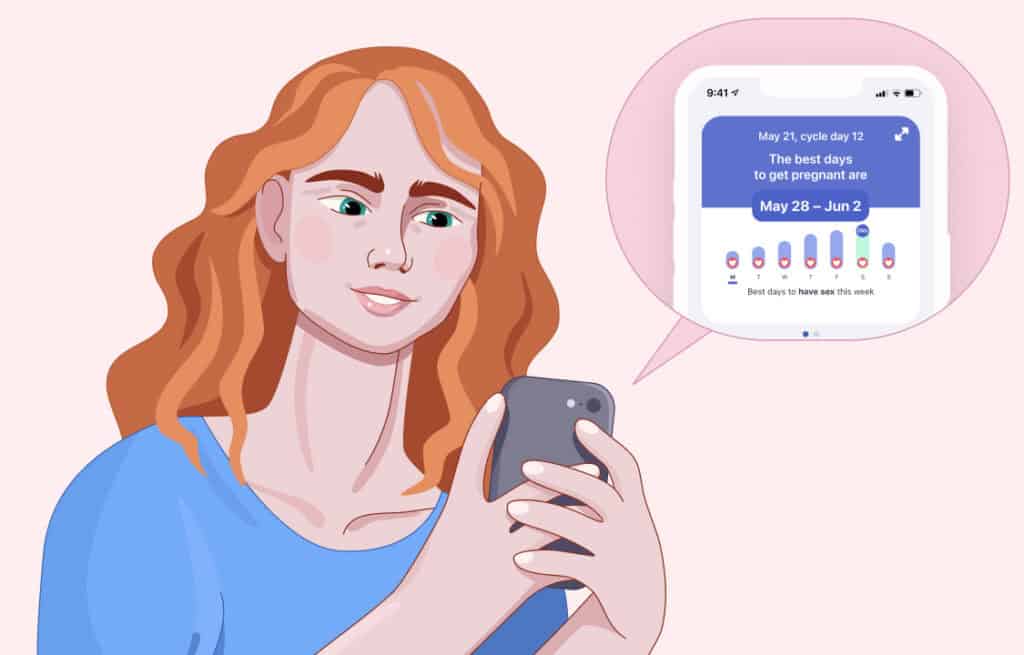
- Updated Mar 2, 2025
- Published
CRAFTED BY HUMAN
Crafted by human At Femia, we provide accurate and up-to-date information at every stage of your journey, from trying to conceive, pregnancy and postnatal support. All content is created by a real person based on in-depth research and own professional experience. Femia ensures that you will receive expert advice, strict accuracy and a personalized approach from our authors/medical experts. Learn more about our editorial policy.
FACT CHECKED
Fact checked At Femia Health, we maintain the highest standards of editorial excellence in delivering content focused on helping you conceive, guiding you through pregnancy, and supporting you postpartum. Explore our content review principles to learn how we ensure the accuracy and quality of our health and lifestyle tips for every stage of your journey.
An egg can survive for about 12-24 hours after release, and sperm can live up to five days inside the female body. This means if you ovulate in the morning and have sex that night, the sperm can still meet the egg. Timing sex a few days before and on the day of ovulation boosts your chances of conception, making the days around ovulation crucial for maximizing fertility.
Have you ever wondered what ovulation is and why it is so vital for getting pregnant? It is a crucial monthly event where one of your ovaries releases an egg, typically about two weeks before your next period. But if you ovulate in the morning can you get pregnant that night? Dive into our guide to understand more about ovulation and how to effectively track your fertile days for the best chance of pregnancy.
What is ovulation?
Ovulation is the best time frame for conception. It happens every month, around the middle of your cycle, approximately two weeks before your next period. What is this process? It’s when one or both of the ovaries releases an egg and it moves towards the uterus.
Do you ovulate in the morning or night? Ovulation can occur at any time, morning or night, but the process itself actually lasts from 16 to 32 hours. The period before and during the release of the egg shows the highest chances of becoming pregnant.
This is just a very rough estimate, but ovulation occurs around day 14 of your cycle (if your cycle is around 28 days). However, it is better to track your cycle to understand when you will ovulate better.
👉Find out more: Bleeding during ovulation: Could it be a sign of pregnancy?
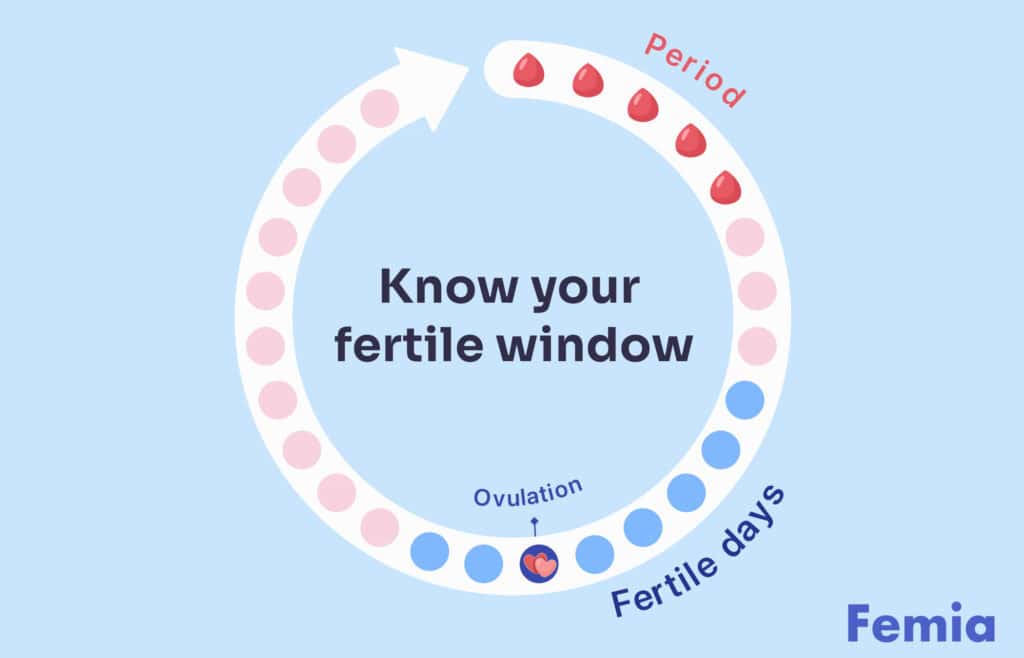
@femia.fertility 🌟 Timing is everything in baby-making! Our fertility expert is here to help you discover the best days to increase your chances of conceiving. Don't miss part two, where we will show you how to pinpoint those lucky days! #ovulation #plannedparenthood #motherhood #pregnnacy #ttc #ttctips #fertilityadvice ♬ original sound - Femia fertility tracker
How can I tell if I am ovulating?
During ovulation, the levels of estrogen and progesterone change; these hormones greatly affect our body. This is why we feel completely different, and our body reacts differently too.
Cervical discharge (mucus) becomes more transparent, liquid, and slippery, somehow similar to lubricant.
Women often experience pain in the lower abdomen. It is also one of the symptoms that can sometimes be mistakenly confused with the onset of menstruation.
The reason for your mood swings may be ovulation, too. During this time, women may feel more sensitive or easily agitated. Additionally, increased sweating can occur, which might add to the overall discomfort.
👉 Find out more: Can you get pregnant when you’re not ovulating
Ovulation often increases sex drive. That is our body’s response to increase the likelihood of getting pregnant.
However, it is essential to remember that each of us experiences these symptoms differently. You may feel subtle symptoms or something completely different. It is also important to discuss your feelings with a trusted healthcare provider if you feel something is not right.
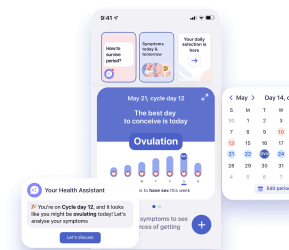
Pain in the ovaries during ovulation
Unfortunately, many women experience noticable pain in their ovaries during ovulation. It may occur in different ways, and the pain can be either sharp or dull. You may experience it from a few hours, up to several days.
Why doesn't ovulation occur?
Quite a few factors can inhibit the ovulation process. Take a closer look at some factors due to which you may not have it:
- Stress
- Irregular cycles (especially if you haven’t had a period for a long time)
- Polycystic Ovarian Syndrome (PCOS)
- Inadequate nutrition (fasting is especially bad for ovulation)
Besides, a doctor will provide you with personalized recommendations about your nutrition to increase the chances of successful conception and easy pregnancy.
And don’t forget that it takes two people to make a baby, so your partner needs to have a check-up too.
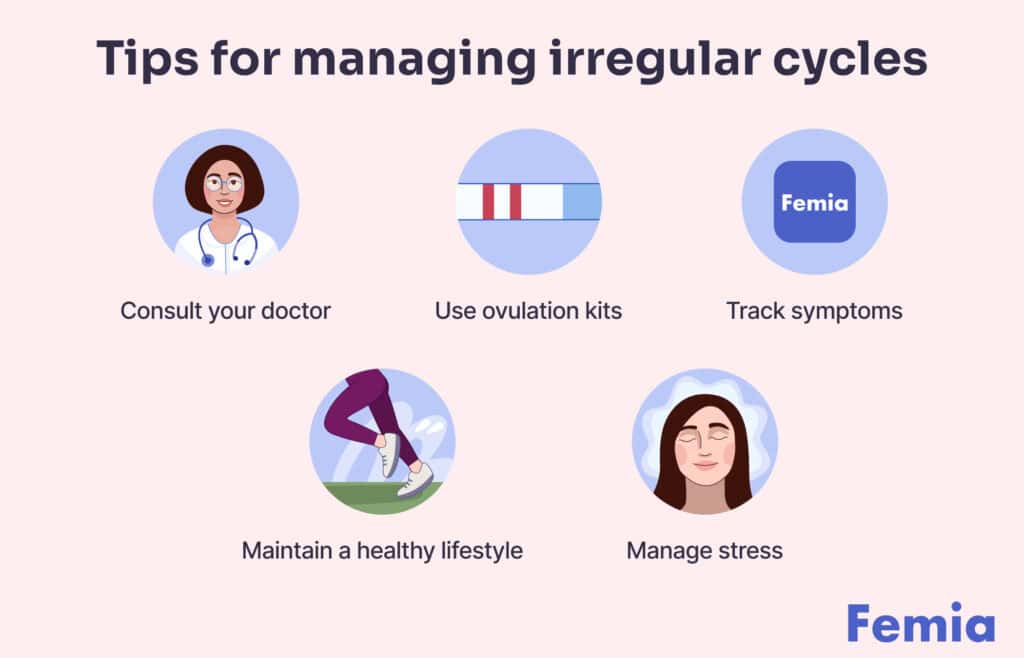
Ovulation and birth control pills
Birth control pills (oral contraceptives) do not allow ovulation to happen, so you will not be able to get pregnant while taking them. It is worth remembering that this method of contraception is 99% effective with perfect use, but exceptions can still happen.
And even if you have already stopped taking the pills, your body might need time to adjust before you can conceive.
That is because after you stop taking oral contraceptives, your body begins to produce the hormones that it previously received from the pills.
For each woman, the body’s reaction to contraceptives is different. For some, ovulation may happen immediately after stopping taking them, while for others the recovery period may last weeks or months.
It’s important to remember that while most people do not experience severe side effects, individual experiences with pills can vary. To ensure normal and problem-free recovery of the body, it is better to consult a doctor.
👉Find out more: How to put pillow under hips to get pregnant
If you ovulate in the morning can you get pregnant that night?
An egg can live in a female body for about 12-24 hours. However, the lifespan of sperm after sexual intercourse is approximately 5 days.
A woman who has sex every day a few days before ovulation, and on that day too, has the greatest chance of getting pregnant.
If you ovulate on the day, you have a chance of sperm reaching the egg. If fertilization occurs within 12-24 hours, you can become pregnant.
But still, the best strategy is to have sex a few days before the process of releasing the egg from the ovary begins. Then the chances of conception will be highest.
If you have sex after ovulation, your chances of getting pregnant are still there, but they are much lower.
Remember that if you do an ovulation test and it turns out to be positive, then the process will occur within 1-2 days. A good moment to conceive!
👉Find out more: How long after implantation bleeding can I test for pregnancy?
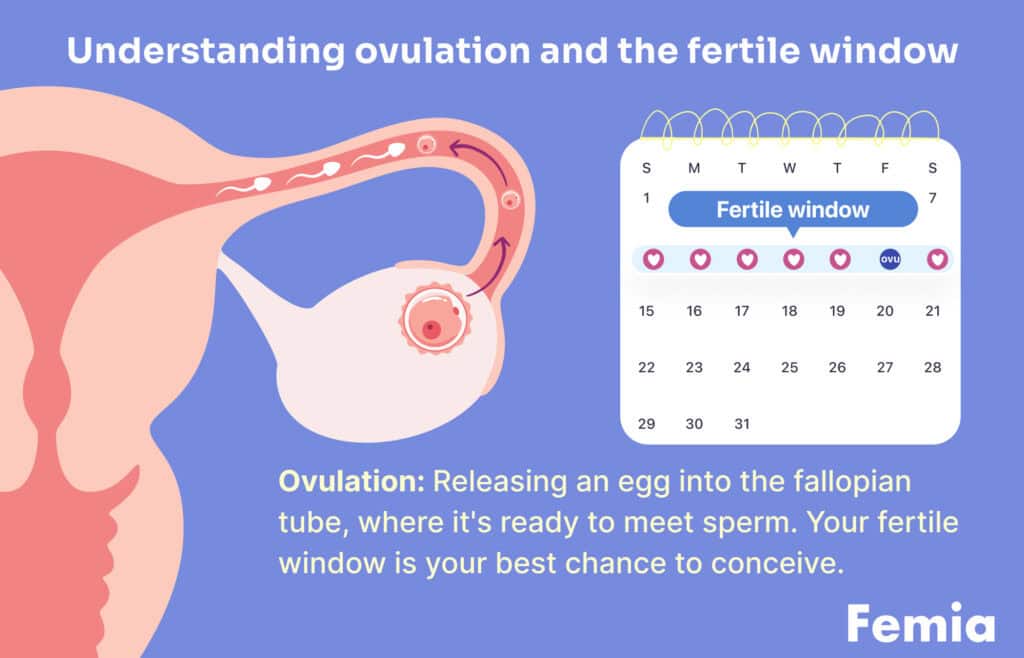
How to track ovulation?
If you are a woman who wants to get pregnant, then it is important to track your cycle. So that your efforts are more effective. There are several ways to track ovulation:
1. Calendar method
If you like to do this kind of tracking manually, then the calendar method is for you. You need to track the start and end dates of your cycles so that you roughly understand what day ovulation will occur. Let us remember that it occurs approximately in the middle of the cycle.
2. Basal temperature
This method involves measuring your basal body temperature every morning. How to do it? Immediately after sleep, you need to take a thermometer and place it in your mouth. The most accurate results are obtained when you do not move and lie down calmly. A drop in temperature suggests ovulation will occur in 1-2 days and an increase in basal body temperature suggests ovulation has occurred.
Note: Obtain a basal body thermometer that measures temperature to the tenth of a degree for the most accurate readings.
The problem is that very different factors affect basal body temperatures, such as stress, illness, or alcohol consumption. Therefore, you should not use this method as the main tool for tracking ovulation, but as an additional one.
3. Ovulation tests
These tests look at the levels of luteinizing hormone in the urine. It rises just before ovulation. You will need to do this test for several days to notice the increase in the hormone in time. A positive test means that ovulation will occur within 1-2 days.
👉 Find out more: Can an ovulation test detect pregnancy: Here’s what you may want to know
4. Vaginal fluids
As said earlier, during ovulation the fluids become clearer, larger, and more slimy. By tracking these changes, you can determine the approximate time of ovulation.
All these methods have their advantages and disadvantages, and combining several of them usually ensures the best effectiveness.
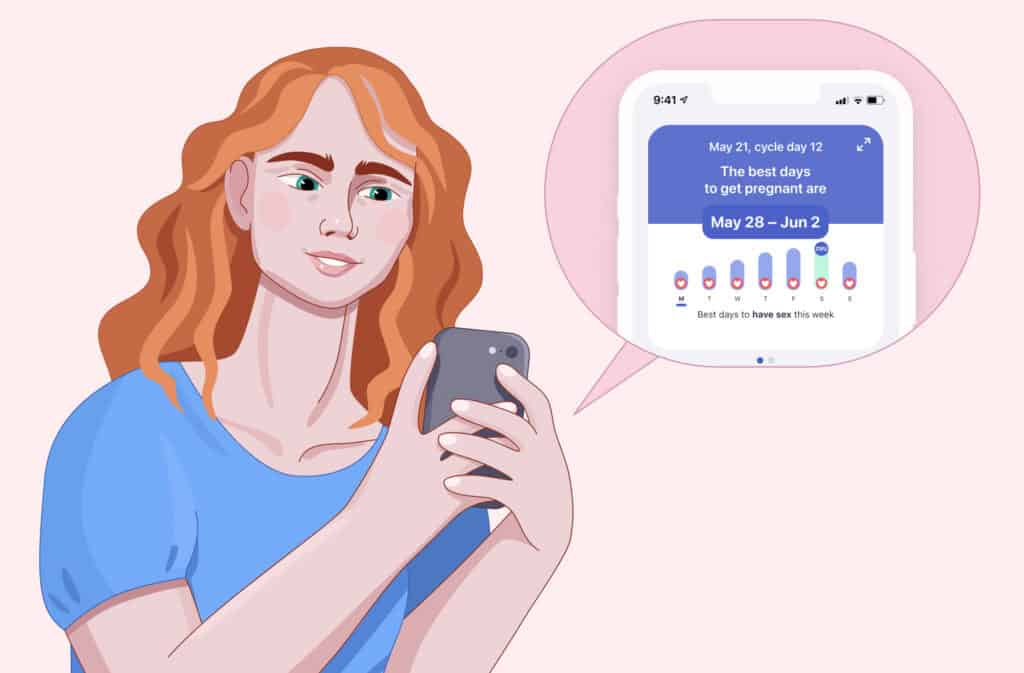
How accurate is an ovulation test?
Ovulation tests are usually quite accurate. However, there are still several factors that can greatly affect the results:
- the amount of liquid drunk the day before testing;
- different test sensitivity;
- each woman’s body produces a different amount of luteinizing hormone;
If you have quite low levels of this hormone even during ovulation, most likely the test will be negative. You will need to use other methods to predict ovulation.

Questions from the Femia community
Do you ovulate in the morning or night?
The exact timing of ovulation can vary from person to person and cycle to cycle. Even predicting where ovulation falls within the cycle—not the specific time of day—can be challenging, and most women just don’t know that.
Levels of hormones such as LH (luteinizing hormone) and estrogen, which regulate ovulation, may change throughout the day. For example, LH levels may peak before ovulation, which may occur at different times of day in different women.
The individual characteristics of a woman can also greatly influence that. Different cycle lengths and distinctive biological characteristics can cause large differences in the timing of ovulation.What is the likelihood of becoming pregnant each day before or after ovulation?
The likelihood of getting pregnant depends on when you have sex in relation to ovulation. In a study, researchers found that conception was possible from about six days before ovulation up to the day of ovulation.
The chance of getting pregnant was lowest (0.10) five days before ovulation and highest (0.33) on the day of ovulation itself.
The age of sperm didn't seem to affect the chance of conception much. Most pregnancies were due to sex within six days before and at ovulation. Timing sex around ovulation didn't affect the baby's gender. That is why, for the women trying to conceive, having sex in the days leading up to and including ovulation is key.How do I catch my ovulation?
To “catch” ovulation, you just need to know when it happens. Use ovulation tests. Track your cycles, record the start and end dates of your monthly cycles. Ovulation usually occurs about 14 days before the start of your next period.
Watch your body for signs of ovulation.
Apps like Femia can be a useful tool for tracking your fertility. They can provide ovulation predictions based on your cycles and symptoms, as well as reminders about the best time to have sex. By following the advice of the application, you increase your chances of successful conception.How many eggs does the ovary produce during ovulation?Question
In some women, the ovaries produce only one egg. But it also happens that both ovaries produce an egg. This occurs in women who are “hyperovulating.”
This condition can occur for a variety of reasons, including genetic factors, hormonal imbalances, or other biological mechanisms. It, however, is not a disease, but a variant of the norm.
Having hyperovulation increases the chances of getting fraternal (dizygotic) twins, but that does not always happen.Is it possible to get pregnant outside of ovulation?
During ovulation, female fertility peaks, and the chance of getting pregnant increases significantly. And even outside of ovulation, you can get pregnant, although the chances will be much lower.
If you have sex outside of ovulation, then do not forget that sperm can live up to 5 days, which means that if you have sex close to fertility time, you still have a chance of getting pregnant.
The bottom line
If you are trying to conceive, then ovulation is the best time to do so. The exact timing of ovulation can vary from person to person and cycle to cycle.
Regular sex during fertile window will help you maximize your chances of getting pregnant.
References
- Soumpasis, Ioannis, Brigid Grace, and Susanne Johnson. “Real-life Insights on Menstrual Cycles and Ovulation Using Big Data.” Human Reproduction Open, 2020, https://www.ncbi.nlm.nih.gov/pmc/articles/PMC7164578/.
- Hamilton-Fairley, Diana, and Alison Taylor. “Anovulation.” BMJ, 6 Sept. 2003, https://www.ncbi.nlm.nih.gov/pmc/articles/PMC192851/.
- Holesh, Julie E., Autumn N. Bass, and Megan Lord. “Physiology, Ovulation.” StatPearls Publishing, Jan. 2024, https://www.ncbi.nlm.nih.gov/books/NBK441996/.
- Owen, Martin. “Physiological Signs of Ovulation and Fertility Readily Observable by Women.” Linacre Quarterly, Feb. 2013, https://www.ncbi.nlm.nih.gov/pmc/articles/PMC6081768/.
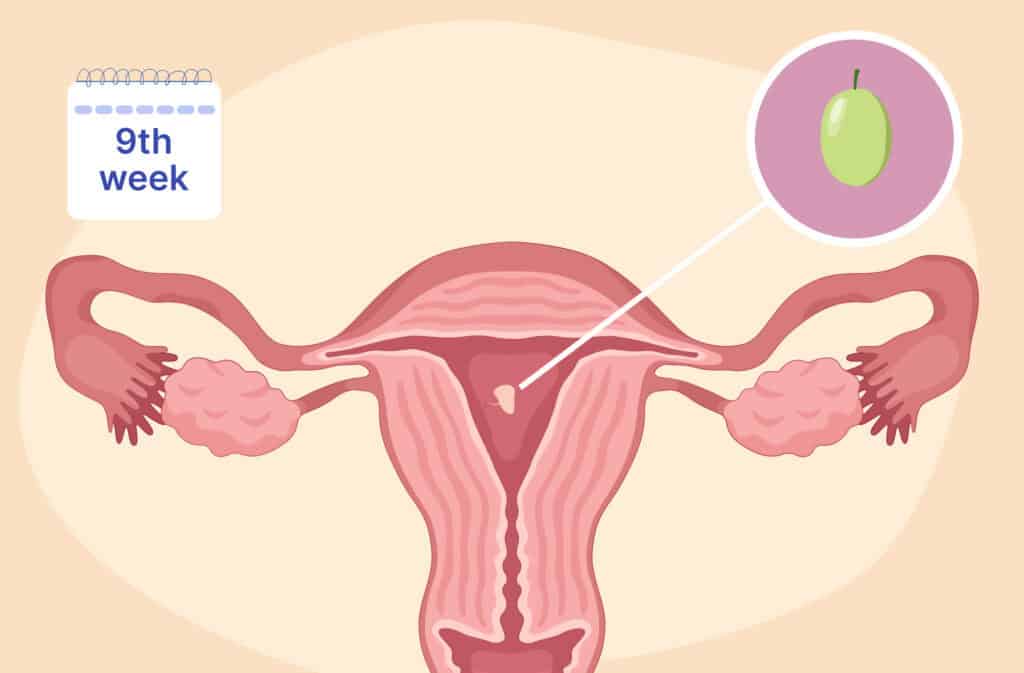
At 9 weeks pregnant, your baby is now moving and growing fast! Find out about symptoms, baby size, and how to care for yourself this week.
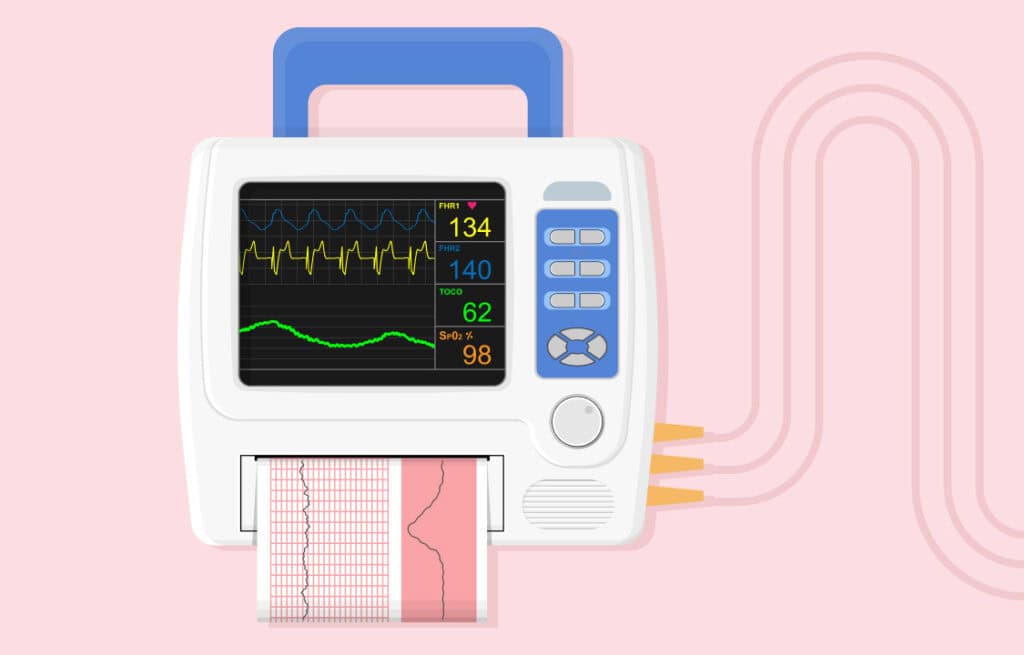
Discover what late decelerations during labor mean, their causes, and how doctors can help. Learn about important interventions to keep both mom and baby safe and healthy.
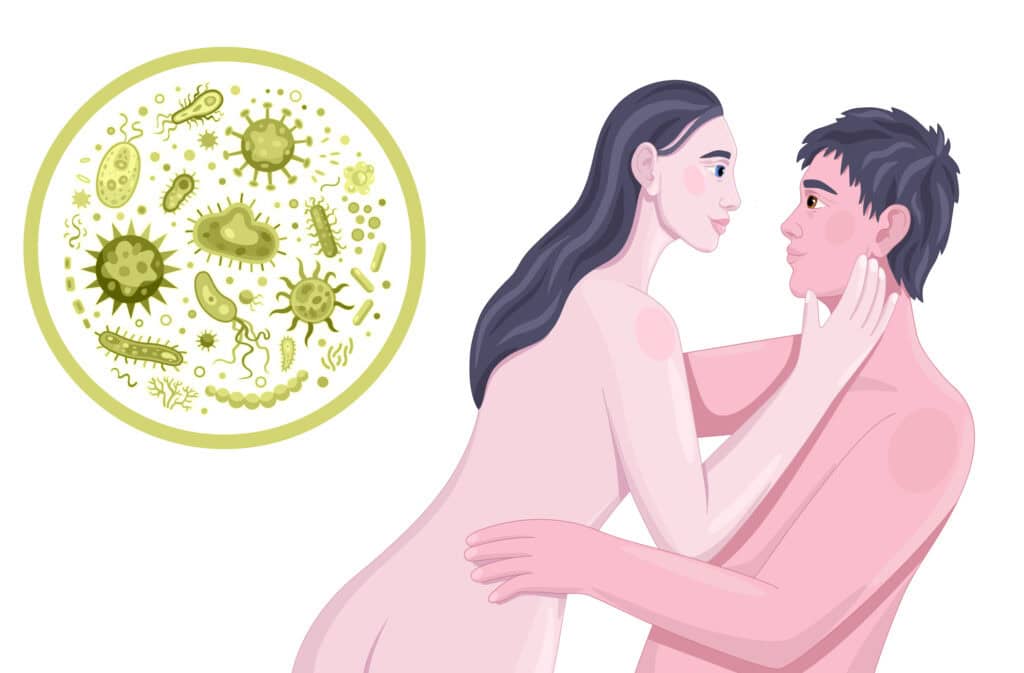
A guide to UTIs covering the basics. Causes, symptoms, and how long do they take to clear up? Plus, the answer to the question can you have sex with a UTI?

